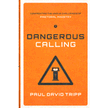Counselors Reflect on Dangerous Calling by Paul Tripp
A Series to Care for the Care Takers of God’s People
“You are most loving patient, kind and gracious when you are aware that there is no truth that you could give to another that you don’t desperately need yourself. You are most humble and gentle when you think that the person you are ministering to is more like you than unlike you.”
It should be easy to see the theme of pride and self-righteousness in these statements. When we believe we are different from others we severely impede our ability to be sympathetic and compassionate. The apostle Paul says in 1 Corinthians 10:11, “Therefore let anyone who thinks that he stands take heed lest he fall.” We are to always be mindful of our deep depravity and sinfulness when counseling and encouraging others. Too often we think our sin isn’t as bad as someone else’s sin and so we don’t treat others with the same grace we want extended to us. It is easy to forget our debts that have been paid, our sins that have been pardoned, and our shame that has been covered. We are a lot like the wicked servant Jesus spoke of who was shown great mercy and whose large debt was forgiven by his master, but when someone was unable to pay him a much smaller debt he was without mercy and treated him harshly. Or similarly we are like the Pharisee in Luke 18 who Jesus said trusted in his own righteousness and treated others with contempt. The wicked servant forgot how great a debt he owed and was unable to pay therefore his master’s great grace shrank to almost nothing. So, he could not reciprocate the grace he’d been given. The grace we extend to others is in proportion to the grace we’ve received from God. And like the Pharisee when we trust in ourselves that we are righteous we arrogantly speak evil of the “tax collectors” around us. Our pride cannot serve us without sacrificing others. I cannot delight in me without destroying you.
How do we stand? Do we stand believing we are immune to certain sins? Do we believe our good conduct protects us from succumbing to certain temptations? Has our few months of consistent Bible reading, prayer, and church attendance created a false sense of imperviousness to sin? Jesus raised the bar when he applied sin to our hearts and not just our actions. Our thoughts, intentions and motives now become the measure and standard. Do we see our anger as murder, our lustful thought as adultery, our gossip as a hate crime?
We ought not only to remind and be honest with ourselves about what we’ve done in thought, word, and deed, but we also must consider what our propensity and capacity is. Do we ask ourselves what are we capable of? When we hear Christ died for our sins, do we only hear the ones we committed or also the ones we have yet to and could commit? As soon as we think we are above certain sins we’re liable to be found guilty of them. Do we recognize that it is only God’s grace that we don’t commit the same atrocities and horrors we see on the news? It is His common grace on all humans that provides us with a conscience to act as our moral rudder, and the specific grace on the Christian who’s been given the Holy Spirit as a “super” conscience to obey Christ from the heart.
We must take care not to try and make ourselves feel better, more pure, and less culpable by comparing ourselves to what others have done. The Scriptures retort, “Who can say ‘I have made my heart pure; I am clean from my sin?” (Proverbs 20:9-10) Among the number of ways we attempt to make our own hearts pure one of them is by comparing our tan sins to others brown sins. Neither is white, but comparatively our stain looks like white. Another is that we compare ourselves to our old selves. We think “at least I’m not doing what I used to.” We compare our current sin to the way we used to sin. We’re not as bad as we were so that must mean we’re ok. As a result we fail to allow God’s kindness (progressive sanctification in light of passed sins) to lead us to repentance (brokenness and turning from our current heart-sins).
Remember that “it is good for the heart to be strengthened by grace” and not by comparisons emerging from various forms of insecurity. There are so many things we use to strengthen our hearts that in the long run actually weaken it. Grace is the only thing that can bolster our hearts without the harmful side-effects of self-aggrandizement.
 |
Dangerous Calling: Confronting the Unique Challenges of Pastoral Ministry By Paul David Tripp / Crossway Books & Bibles |